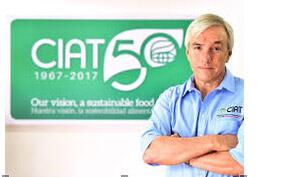CIAT Director urges students to “save humanity” by pursuing careers in food and agriculture

Urging younger people “to join the agricultural field to save humanity,” the Director General of the International Center for Tropical Agriculture (CIAT) Ruben G. Echeverría presented the 2018 ACES Distinguished International Lecture on December 4 to a large audience of Illinois students, faculty, and staff.
View the recorded lecture here.
Dr. Echeverría contextualized his lecture’s title, “Magical Realism…How to Achieve a Sustainable Food Future,” with a quote from Colombian novelist Gabriel García Marquez:
“The first condition of magical realism, as its name suggests, is that it is a fact that is rigorously true but nonetheless appears to be fantastic.”
Echeverría asked, “Is a sustainable food future true or something we only dream of in PowerPoint?”
His lecture proposed that a sustainable food future is not an unachievable dream, and by speaking on the Illinois campus, he hoped to motivate a new generation to help achieve this.
CIAT, based in Cali, Colombia, is a research center within the Consultative Group on International Agricultural Research (CGIAR). CIAT has a mandate for global research related to sustainable food systems, including crop biodiversity and productivity, management of natural resources, climate change, ecosystem services, and policy analysis.
“There is a global consensus there are six drivers of change impacting humanity all at once: population growth, environmental degradation, digital revolution, urbanization, climate change, and biotech innovations. But there is less consensus on how to tackle such changes and particularly how to do it collectively and in a sustained manner,” he said.
The way ahead, he proposed, includes eco-efficient and resilient agricultural systems, specifically:
- Providing enough and safe food
- Better nutrition for poor and better diets for rich
- Diminished use of fossil fuels
- Adapting to extreme weather and water stresses
But Echeverría emphasized the untapped potential of technology to achieve a sustainable food future. CIAT is leading the way in terms of mobilizing data analytics to help enhance sustainable food production. But despite advances in the use of sensors and remote sensing to inform better farm management, the potential for data-driven farming is unmet. In the U.S. agriculture is #23 out of 23 sectors in terms of digitalization, and U.S. agriculture is advanced compared to other countries, he said.
He also introduced one of CIAT’s most promising new initiatives, FUTURE SEEDS.
CIAT is already home to the world’s largest collection of beans, cassava, and tropical forages, and FUTURE SEEDS is an expansion of their gene bank’s capacity to guarantee the continued existence of these plans which help nourish hundreds of millions of people. This new gene bank will open within a year.
Read more about FUTURE SEEDS here.
At several points during the lecture, Dr. Echeverría invited Illinois researchers to visit CIAT. He noted possible partnerships with Illinois as:
- Linking thesis and dissertations to CIAT’s ongoing programs
- Hosting Postdocs for research programs
- Hosting faculty for sabbaticals
Director of ACES International Programs Alex Winter-Nelson will serve as the point of contact to prioritize possible activities and synergies with CIAT.
Echeverría said he initially joined a CGIAR center to do his thesis work but ended up staying on. Today’s students of agriculture have many more possibilities than people of his generation, and if students are not sure what to do with their degrees, they should strongly consider going into agricultural development, he said.
“No matter your field or topic of interest, we [CGIAR] have a center for you,” he said.
A recorded version of this lecture will be posted soon. Please check back.